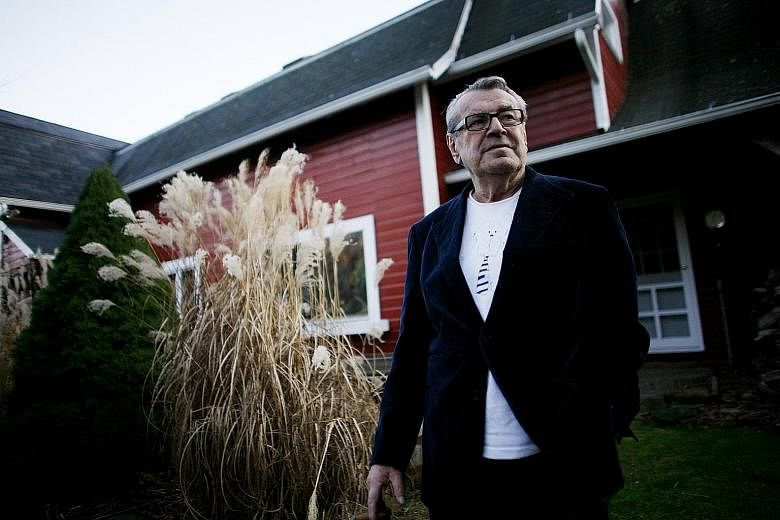NEW YORK • Milos Forman, who had stage fright, has said he could never have been an actor. But as a director, he managed to get the best out of actors.
Last Saturday, the Czech-born, two-time Oscar winner behind One Flew Over The Cuckoo's Nest (1975) and Amadeus (1984) died at a hospital in Danbury, Connecticut. He was 86.
The cause was not disclosed.
Forman made several acclaimed films in the 1960s in Czechoslovakia before settling in the United States after a 1968 Soviet crackdown ended a brief period of cultural flowering known as the Prague Spring.
Over the next four decades, he made fewer than 10 films, each vastly different from the others.
But in most of his movies - including Cuckoo's Nest, Amadeus, The People Vs Larry Flynt (1996) and Goya's Ghosts (2006) - there was an abiding spirit of the rebel seeking to be free.
"I lived in a society where people who called for censorship won," Forman, who grew up under communism and lost both parents in the Holocaust, said in 1996.
"I know what a devastating effect it has on life - not only on the artist, but on everybody too."
He was struggling to make a living, with only one American film to his credit - the box-office bomb Taking Off (1971) - when he was chosen to direct Cuckoo's Nest.
It was based on Ken Kesey's novel, a touchstone of the 1960s counter-culture, about a rebellious gadfly's efforts to survive inside a prison-like mental hospital.
Several celebrated actresses, including Anne Bancroft, Ellen Burstyn and Angela Lansbury, turned down the part of Nurse Ratched, who tried to keep the men in her ward under control.
Forman cast Louise Fletcher, a little-known actress who had not worked in years.
When the film was released in 1975, it was a hit. It bagged five Academy Awards, including Best Picture. Forman won for directing, while Jack Nicholson and Fletcher got the nods for Best Actor and Best actress.
Forman's next two films did not fare so well, but Amadeus restored his box-office credentials.
He ventured into the world of 18th-century classical music, reshaping Peter Shaffer's play as a psychological exploration of genius and jealousy.
The genius was the composer Wolfgang Amadeus Mozart, depicted in the film as childish and ill-mannered whenever engaged in anything not related to music.
The jealousy comes from his less-talented rival, Antonio Salieri, who goes so far as to plot Mozart's murder. Tom Hulce as Mozart and F. Murray Abraham as Salieri were nominated for best-actor Oscars.
Amadeus swept the 1985 Academy Awards, taking eight prizes in all, including Best Picture, Best Actor (Abraham) and Forman's second as Best Director.
It was another career highlight for Forman, who was born on Feb 18, 1932. His father was a teacher, while his mother was a housewife.
He worked for Czech television and a film studio before completing his first feature-length movie, Black Peter, in 1963.
Forman's film, The Firemen's Ball (1967), included a scene of a house burning down while firefighters are celebrating at a retirement party.
It was banned in Czechoslovakia and he was forced to apologise to the country's firefighters.
His marriages to Czech film actresses Jana Brejchova and Vera Kresadlova ended in divorce.
After Forman published an autobiography in 1994, he continued directing films, most notably The People Vs Larry Flynt, for which he received his third Oscar nomination for Best Director.
In 1999, he directed Man On The Moon, starring Jim Carrey, about the life of comedian Andy Kaufman.
Forman's final film, Goya's Ghosts, was about Spanish artist Francisco Goya.
Away from directing and despite his stage fright, he had a few cameo roles in films, including Nora Ephron's Heartburn in 1986.
"Every director should try it, just to know how it feels," he said in 2007. "Get in front of the camera and you see it's not at all so easy."
WASHINGTON POST

